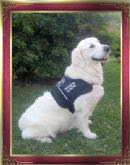
Rebel and I were walking along at Circular Quay, enjoying the sunshine when an off leash dog rushed at Rebel. This dog attacked Rebel without warning, I didn't even see it coming toward us. Rebel was injured on he right shoulder. The owner of the dog scooped the dog into his arms and ran away without saying a word to me.
I didn’t want to make this blog session about winging or for complaining. Instead to remind others that when a disabled person has a dog in harness it is under control and working. This means that it is vulnerable to other dogs which may be off lead. Dog communication is conveyed by a dog using body language. Working assistance dogs are trained to be submissive and be at the same time protective of their handlers.
Handlers and dogs must pass vigorous training and testing to be afforded the status of public access. This can take many months of training and hours of practice. A working dogs training can be ruined and the dog no longer able to pass these test because of the lack of understanding of people approaching the dog and handler. A misguided pat or distraction may cause an accidental disruptive event at a crucial time in a dogs training. There is a severe shortage of trained dogs for disabled people. Men will bark or whistle at the dog and women will get close to its face and use baby talk. This is disruptive behavior for our dogs and not a safe method of approaching any dog.
Assistance dogs are trained to respond to commands, to perform repetitive tasks in a specific manner and to stay focused on the handler. Unplanned interruptions slow the training process. To qualify as an assistance dog, must meet rigid behavior, temperament and health standards and demonstrate mastery of a wide range of skills.
It may not be obvious at that moment what the dog is doing or is about to do to aid the person, but the dogs attention to duty is often critical to the persons safety. Assistance dogs learn to do these things unobtrusively and to blend into the situation, so its not surprising the dog may seem to not be doing anything. The better trained a dog is, the less obvious the dog is working. I have had people say to me what is your dog doing for you right now? He is just setting there beside you. Rebel is a Mobility Dog. She aids my balance in many ways, both specifically by bracing for the for me, and to hold on to, and by moving with the me on uneven ground.
You it may think that it be appropriate to ask if you may pet the dog. Don’t get your feelings hurt if the handler asks you not to. There are all kinds of reasons it might be a problem at that exact moment. This is important for maintaining the dog’s training as a safe assistance dog. It is the responsibility of the handler to insure that the dogs behavior is disruptive to the business or other function of the place.
Australian law provides Assistance dogs, guide dogs and dogs in training the right to accompany physically disabled, blind or hearing-impaired people on public accommodations and to other areas open to the public. What the law says and what people do are often two different matters, misunderstanding and lack of knowledge about the roles and rights of assistance dogs. Most business owners will comply once I cite the law, yet it too frequently takes me having to request a manager or owner. Employees should have that knowledge. This takes time and practice to shift from shopper to access law educator.
 Rebel and I have a date.
Rebel and I have a date.





